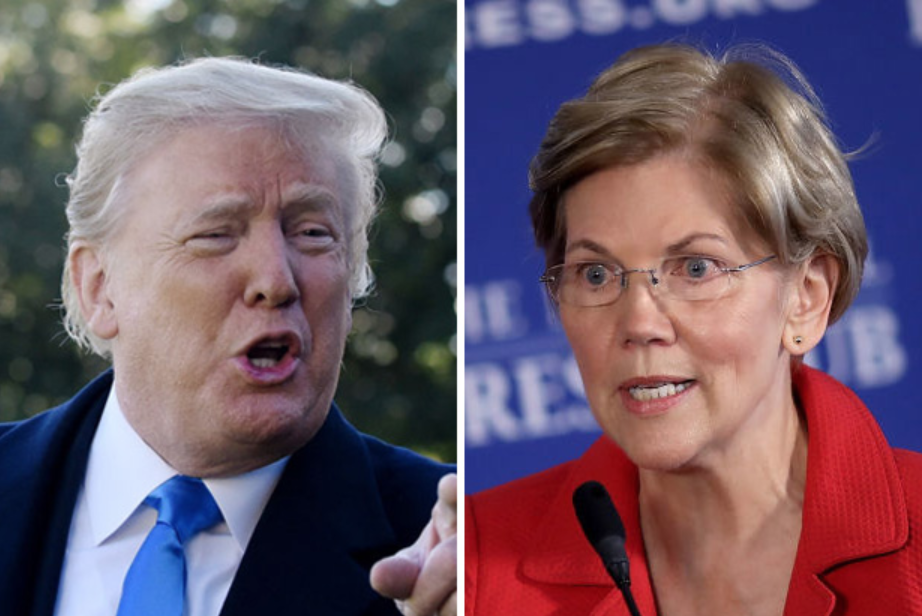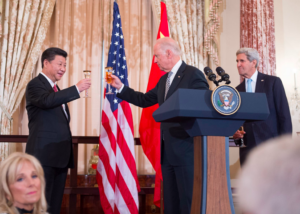
It is often said that imitation is the sincerest form of flattery, which is why one of the greatest ironies of the 2020 presidential race thus far has been Sen. Elizabeth Warren’s (D-MA) wholesale embrace of President Donald Trump’s economic nationalism.
Trump’s penchant for protectionism and open disdain for free trade agreements was forged in the 1980s amidst the Japanese economic miracle when Washington was running substantial annual trade deficits with Tokyo. As Trump’s nascent political aspirations were beginning to take shape, he began advocating for raising import tariffs and picking trade fights. China can be substituted for Japan in this zero-sum, trade deficit reduction-centric model. Since then, economic nationalism has remained one of the few consistent themes of his political career.
Warren, on the other hand, has made a name for herself as the President’s political archnemesis in the Senate. She has been one of his most vocal on the campaign trail and on capitol hill, only voting with president 5.9% of the time. In turn, she has become the subject of his Pocahontas slur, and yet, for whatever reason, she seems to be a loyal disciple of his on trade.
In a recent campaign advertisement, Sen. Warren employs Trump’s “American First” rhetoric when claiming that “a lot of giant companies refer to themselves as American, but face it, they have no loyalty or allegiance to America.” To prevent the offshoring of jobs by foreign shareholders and investors motivated solely by profit, she proposes establishing a new federal agency called the Department of Economic Development. This new federal behemoth’s role will be to protect American workers from all the negative externalities of globalization, through aggressive intervention in the economy under the guise of her “Economic Patriotism” doctrine. This misguided and central-planning approach would dramatically disrupt supply chains and permanently alter the relationship between the federal government and the individual for the worse.
Warren has also laid out an array of labor and environmental trade preconditions, which not only exudes hypocrisy but seems to mimic President Trump’s contempt for America’s most reliable partners. Beyond the fact that the rules are so draconian that the US does not currently meet them, the preconditions would apply not only to new trade deals but would require the renegotiation of all existing trade treaties as well. Attempting to coerce our allies into meeting these unrealistic standards is extremely ill-advised. This insurmountable undertaking threatens to jeopardize our most important trade relationships and threatens to isolate the U.S., dramatically hiking the cost of consumer goods and wreaking havoc on the economy.
But these sweeping proposals would not only have a depressing effect on GDP, wages, and employment. Warren’s trade policies would continue Trump’s assault on post-war free trade consensus.
Warren would like to use the United States economic clout as a battering ram to promote her radically narrow vision for the 21st Century global economy. This is a vision for a world in which growth is anemic, wages are stagnant, and the state plays an outsized role in rectifying any supposed economic injustice. Her proposal to publicly disclose negotiating drafts and provide the public with an opportunity to comment is also sure to scare away any potential trade partner looking to make politically sensitive concessions. One can reasonably conclude that there would not be any trade deals during a Warren presidency, and the rest of the world will likely bypass the United States when looking for new trading partners.
The political logic of Warren’s proposal is simple. By doubling down on Trump’s economic nationalism, she thinks she can usurp much of his base of support in Rust Belt swing states he won in 2016. However, there is scant polling data that supports the notion that protectionism is a recipe for electoral success, even in states in the industrial Midwest, which are supposed hotbeds of protectionism. According to a Detroit Regional Chamber of Commerce statewide poll, by a margin of 47-23.5, Michigan voters believe tariffs on foreign-made products hurt consumers like themselves.
The evidence is clear. If Democrats would like to beat Donald Trump in 2020, they should try to draw a dichotomy between themselves some of his worst impulses, protectionism being one of them. They should nominate someone committed to reviving America’s standing in the world as a beacon for liberalism and free-trade, not someone who is simply trying to fulfill the wish list of every party activist.
Bobby Miller



